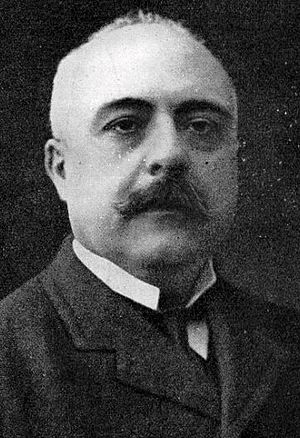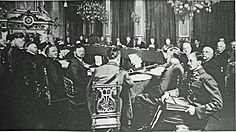Antonio Salandra facts for kids
Quick facts for kids
Antonio Salandra
|
|
|---|---|
 |
|
| Prime Minister of Italy | |
| In office 21 March 1914 – 18 June 1916 |
|
| Monarch | Victor Emmanuel III |
| Preceded by | Giovanni Giolitti |
| Succeeded by | Paolo Boselli |
| Personal details | |
| Born | August 13, 1853 Troia, Apulia, Kingdom of the Two Sicilies |
| Died | December 9, 1931 (aged 78) Rome, Kingdom of Italy |
| Political party | Historical Right (1901–1913) Liberal Union (1913–1922) Italian Liberal Party (1922–1924) |
| Alma mater | University of Naples |
| Profession | Journalist, politician, lawyer |
Antonio Salandra (13 August 1853 – 9 December 1931) was a conservative Italian politician who served as the 21st prime minister of Italy between 1914 and 1916. He ensured the entry of Italy in World War I on the side of the Triple Entente (the United Kingdom, France, and the Russian Empire) to fulfil Italy’s irredentist claims.
Early life and political career
Born in Troia (Province of Foggia, Apulia), he graduated from the University of Naples in 1875 and then became instructor and later professor of administrative law at the University of Rome.
He was Minister of Agriculture (1899–1900) in the conservative government of Luigi Pelloux and subsequently Minister of the Treasury (1906) and Italian Minister of Finance (1909–1910) in the governments of Sidney Sonnino.
Prime Minister
In March 1914, the conservative Salandra was brought into the national cabinet upon the fall of the government of Giovanni Giolitti, as the choice of Giolitti himself, who still commanded the support of most Italian parliamentarians. Salandra's government was the most conservative one that Italy had seen for a long time. Salandra soon fell out with Giolitti over the question of Italian participation in World War I.
At the outbreak of World War I in August 1914, Salandra declared that Italy would not commit its troops, maintaining that the Triple Alliance had only a defensive stance and Austria-Hungary had been the aggressor. In reality, both Salandra and his ministers of Foreign Affairs, Antonino Paternò Castello, who was succeeded by Sidney Sonnino in November 1914, began to probe which side would grant the best reward for Italy's entrance in the war and to fulfil Italy’s irredentist claims.
Entering World War I

Salandra used the term "sacred egoism" (sacro egoismo) to define Italy's outlook on which side Italy would enter the war. Expecting the war would be short – over by the late summer of 1915 – there was some pressure on the decision to make.
Negotiations had been started between Sonnino, the British Foreign Secretary Edward Grey and the French Foreign Minister Jules Cambon.
The secret pact, the Treaty of London or London Pact (Italian: Patto di Londra), was signed between the Triple Entente (the United Kingdom, France, and the Russian Empire) and the Kingdom of Italy. According to the pact, Italy was to leave the Triple Alliance and join the Triple Entente. Italy was to declare war against Germany and Austria-Hungary within a month in return for territorial concessions at the end of the war.
While Giolitti supported neutrality, Salandra and Sonnino, supported intervention on the side of the Allies, and secured Italy's entrance into the war despite the opposition of the majority in parliament. On 3 May 1915, Italy officially revoked the Triple Alliance. In the following days Giolitti and the neutralist majority of the Parliament opposed declaring war, while nationalist crowds demonstrated in public areas for entering the war. On 13 May 1915, Salandra offered his resignation, but Giolitti, fearful of nationalist disorder that might break into open rebellion, declined to succeed him as prime minister and Salandra's resignation was not accepted.
On 23 May 1915, Italy declared war on Austria-Hungary. Salandra had expected that Italy's entrance on the allied side would bring the war to a quick solution, but in fact it changed little, and Italy's first year in the war was marked by only very limited success. Following the success of an Austrian offensive from the Trentino in the spring of 1916, Salandra was forced to resign.
After World War I, Salandra moved further to the right, and supported Mussolini's accession to power in 1922. Nine years later he died in Rome.
He was awarded Order of Karađorđe's Star.
Works
He is the author of a considerable number of works on economics, finance, history, law, and politics (New International Encyclopedia). These include:
- Tratto della giustizia amministrativo (1904)
- La politica nazionale e il partito liberale (1912)
- Lezioni di diritto amministrativo (two volumes, 1912)
- Politica e legislazione : saggi, raccolti da Giustino Fortunato (1915)
- Il discorso contro la malafede tedesca (1915)
- Italy and the Great War: From Neutrality to Intervention (London: Edward Arnold, 1932),
See also
 In Spanish: Antonio Salandra para niños
In Spanish: Antonio Salandra para niños
- Italian entry into World War I
- Radiosomaggismo

